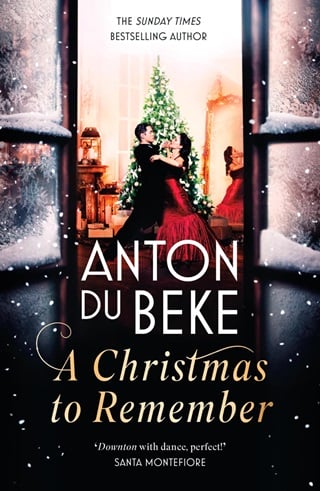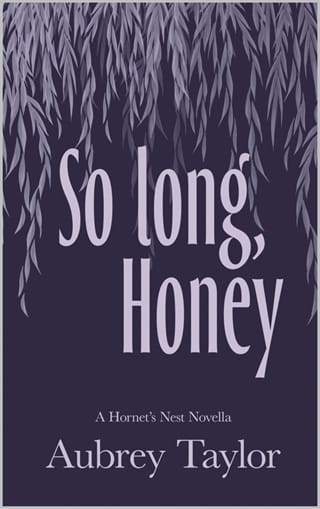Chapter Thirteen
THE HOUSE AT 62 ALBERT YARD, Lambeth, was not typically quiet – but today the silence on the landing at the top of the stairs was absolute. Seven breaths were held, seven voices reined in, seven delighted smiles restrained from becoming deep, belly laughs. The only sound at all was a gentle tapping and a whispered voice from beyond the bedroom door.
On the other side of that door, Billy Brogan tapped the four sides of a simple box on the floorboards with his feet, counting under his breath with every step – ‘One, two, three, four .?.?. One, two, three, four .?.?.’ – while Frank Nettleton perched on the edge of the bed and watched.
‘Oh, Billy, you’re thinking too much!’
Billy, who had his arms open and held in a frame, as if enveloping some elegant dancer, froze. The scowl deepened on his face.
‘Thinking’s what I’m good at, Frank. How am I going to put my feet in the right spot if I don’t think?’ He returned to his counting. ‘One, two, three .?.?. One, two, three .?.?.’
‘Oh, for heaven’s sake!’ Frank chortled. ‘Let me show you!’ And in a second he had taken Billy in his own arms, leading him in a box-step around the carpet they’d cleared of all his old books and toys. ‘It’s like this, Billy. You just have to let it go. You don’t need to think to breathe, do you? You don’t need to think to walk. So why would you need to think to dance? It’s just counting. Even those little scamps out there can count.’
Billy shot a look at the door. It was no secret that all of his brothers and sisters were crowded at the top of the stairs, desperate to catch a glimpse of what was happening beyond the bedroom door. Patrick and Annie, Conor and Daniel, Roisin and Holly and little Gracie May – by rights they ought to have been at the breakfast table, but apparently the idea of Billy learning a little waltzing was much more important than food.
‘Come on, Billy, loosen up. You’re too stiff.’
‘I can’t loosen up – you’re holding me too tight.’
‘Too tight! I barely got my hands on you.’
‘Yes, well, it’s giving me the creeps. You’re standing too close.’
Frank laughed. ‘Well, how close do you want Ruth Attercliffe to stand?’
‘Not as close as this, Frank. I can feel your heart beat.’
‘That’s your heart!’ Frank beamed. ‘Billy, you’re nervous! Look, there’s only you and me here. Nobody’s going to laugh at you. You get used to this, Frank, and you can get used to anything. Just follow me. And that counting – for heaven’s sake, try not to do it out loud. Soon enough, you won’t need to count at all.’
He tried to count in his head. One. But it was harder than it sounded. Two. Three. Soon he had started counting out loud again. One. And, as soon as that had happened, he was getting louder and louder – TWO! THREE! – focusing as much on the counting itself as he was on the placement of his feet. ONE! TWO! THREE!
So they stepped and they turned, and they stepped and they turned – and, somewhere along the way, Billy started to feel that he’d got the hang of this, that perhaps he might even one day be able to soar across a dance hall like all of the rest.
Until, all of a sudden, he was on the floor, with Frank entangled in his arms – and, looking up, he was startled to see that, somewhere along the way, the bedroom door had been pushed open, and a gaggle of faces had been staring at him with unadulterated delight.
Even little Gracie May – at four years old, the youngest of all the Brogan brood – was clapping in glee.
Billy rough-housed Frank away and leaped to his feet, racing at his brothers and sisters with a fist clenched tight.
‘Off with you, you lot!’ he cried out – but not one of the Brogan brood was afraid. They never could be – not of their big brother. Instead, all a humiliated Billy could do was carve a path through them, calling back to Frank as he loped down the stairs, ‘Come on, Frankie, we got work to be doing – not like this lazy lot!’
After Billy was gone, Frank came and crouched among the overjoyed children.
‘You lot’ll put him off forever if you keep on laughing!’
‘It was funny though, Uncle Frank!’
Frank loved it when the Brogan children called him ‘uncle’. He’d been boarding with the Brogans for a year, ever since Nancy set him up at the Buckingham and wrote for him to come down from their old home in the Lancashire hills. Frank liked to think he was more of a big brother to them all – especially now that Billy had been afforded a room in the staff quarters at the Buckingham – but, either way, it meant he was part of the family, and this was a feeling quite unlike any other.
He grinned. ‘I know it’s funny,’ he said quietly, so that his voice did not carry, ‘but only because he’s getting so cross with himself! Now, come on, it’s breakfast!’
Downstairs, Mrs Brogan watched her brood tumble after Billy and Frank. Billy was scowling as he marched furiously for the front door.
‘I’ve a lot to deal with, and I won’t listen to this a moment longer. What with Miss Marchmont banished from the ballroom and all the guests scheduled to dance with her needing to know what’s going on, and be found replacements, and be dealt with at the desks, I’m a wanted man.’
‘Just not on the dance floor!’ his little sister Annie howled from the bottom of the stairs.
‘Come on, Frank,’ grunted Billy. ‘We’ve places to be.’
When they were almost at the door, Frank shaking his head ruefully at the gathered children, Mrs Brogan scurried after them.
‘Is everything all right, Billy? The Buckingham’s not in trouble again, is it?’
That was the perpetual fear in the Brogan household. A brood like theirs was not uncostly, and the wages William Brogan Senior brought home from Billingsgate did not always keep up with the repairs to their dilapidated old house, let alone the coal and groceries and clothes that the children needed. Bed and board from Frank went some way to offsetting those costs, but without the pay Billy sent home from the Buckingham (not to say the offcuts of venison, half-eaten jars of pickles and day-old loaves he rescued from the kitchen waste), the Brogans would soon feel the pinch.
‘Nothing like that, Ma. At least, I hope not.’ Billy opened the front door. Though it was early, the summer sun was in the ascendant. ‘It’s this business with Miss Marchmont. They say Mr Charles banished her until he could put his pleas before the board. Sometimes, if you let a fracas die down, people stop talking about it. But .?.?. everyone’s talking about it being in the society pages. What that might do to the ballroom. And we’ve already got guests wondering where she’s been. All it takes is one chattering chambermaid—’
Frank needled him in the ribs with the point of a finger.
‘Not that all chambermaids are chattering, of course. But all it takes is one loose tongue. Now, I personally have known about Miss Marchmont’s secret for two years, and I never breathed a word, so .?.?.’
Billy’s voice petered out. What he had said wasn’t strictly true, for he’d found himself coerced into telling Miss Vivienne Edgerton, back when she was spending most of her time in the cocktail lounge, or imbibing the powders the old head concierge used to get Billy to provide for her. He was truly ashamed of this, and keeping Miss Marchmont’s secret since then had been the way he absolved himself. Now it was all coming crashing down.
‘Miss Marchmont don’t deserve it, does she, Frank? She’s done the Buckingham proud. We’re all standing beside her. Even Mr Charles, I should think, in his own way.’
Billy and Frank talked it through as they made the long amble up to the Buckingham, over the bridge at Westminster and through St James’s Park, where the guards were on parade outside Buckingham Palace. In summer, this was the most glorious walk of all. Billy loved to saunter through the trees where, in days gone by, true princes and princesses of the realm had parleyed and played. Just being here made him feel special – and it might even have made him forget his failures on the dance floor, if the enigmatic figure of Raymond de Guise hadn’t been waiting for them the moment they slipped into the hotel through the tradesman’s entrance.
‘Mr de Guise!’ Frank stammered. ‘I mean, Raymond. What are you doing here?’
‘Why, waiting for you, of course.’
It wasn’t just that the sight of Raymond, loitering among the dust-sheets and crates by the tradesman’s entrance, was strange. It was that he was decked out in his finest evening wear, a tailored midnight blue suit and dress shirt, his black hair combed back with pomade and glistening like lacquer.
‘I’ll leave you two to your chinwag,’ Billy declared, hurrying onwards. ‘I got important things to attend to. This hotel waits for no man.’
As Billy passed, Raymond called out, ‘How are those lessons going, Billy?’
Billy beamed. ‘Mr de Guise, I’m prancing on air!’ and flicked his feet in such a fashion that the toes of the left caught the heels of the right, sending him staggering out of the storeroom and on up the hall.
Frank shrugged. ‘Not well. Raymond, is it possible that some people just .?.?. can’t dance?’
‘It’s quite possible,’ Raymond said, ‘but most of those people are cold in the ground.’ It took Frank a little while to catch on to the joke, by which time Raymond was saying, ‘Frank, there’s something I thought you might like to see.’
‘Why are you dressed up like that, Raymond? Breakfast can’t have been served yet. The demonstration dances aren’t for hours.’
‘Frank,’ Raymond said with a thrill, ‘they’re here.’
Frank didn’t need to think twice to know who Raymond meant. Like the rest of the Buckingham Hotel, he’d been anticipating their arrival all season.
‘The Winter Hollers.’
To Frank, even their name conjured up an air of magic and mystery.
‘Fresh in off the boat. I’m to meet them in the Grand shortly, and put on my best for them. They’ll want to know where Miss Marchmont is, just like everyone else. But if I can dazzle them with our ballroom, perhaps that won’t matter. The whole of the dance troupe are bereft. But perhaps the Winter Hollers coming could set things right.’
‘All the way from Vienna, Mr de Guise. Dancing their way across the Continent – what a life that might be .?.?.’
‘Well, come on, Frank. Mr Charles has been introducing them to their suites – personal service, from our hotel director himself – but they’ll be bound for the Grand any moment.’
Frank needed no further encouragement. He followed Raymond up, through the snaking labyrinth of service passageways unseen by the guests , and to the reception hall – where the gates of the golden lifts were already opening, revealing a collection of faces and figures he had never seen before.
‘Mr de Guise, is that .?.?. ?’
‘Jonas Holler.’ Raymond nodded towards a long, lithe man with a head of jet-black hair that rivalled his own. ‘Karina Kainz, his partner on the dance floor.’ He indicated a statuesque blonde lady emerging from the huddle behind them. ‘Oh, Frank, it takes me back – I’d meet companies like this every season when I crossed the Continent with Georges.’
The guests had all emerged from the lift now. Others were fanning into the reception hall, having descended by the palatial guest staircase tucked just behind. At once, Raymond stood to attention.
‘I’ve got to go – put on a show of my own. But I wanted you to see them. Keep dancing like you do, smooth off those rough edges, find a little more grace, and you might be dancing in a company like this one day. I mean it, Frank.’
With those words, Raymond hurried to meet the Winter Holler Company in the reception hall. Frank supposed he should have gone his own way then, down to the hotel laundry where the other pages gathered – but he didn’t want to move a muscle. He only wanted to see. Down there, Raymond was throwing his arms open wide and bowing to a portly middle-aged man, whose face was dominated by an enormous silver moustache, waxed into such curls that they looked like the tusks of a leopard seal. Then he was introduced, one after another, to the new faces in the crowd, and soon he was bowing graciously to Karina Kainz. Her hair was the colour of the cornfields Frank used to trundle past in the valley back home.
He was not sure why the idea of the travelling company brought such wonder to his heart. He’d seen the finest dancers in London – by God, he was going to have one as a brother! – and perhaps that ought to have dulled the awe he was feeling now. But the idea that they’d crossed a continent, simply to dance in these halls, filled him not only with wonder but with wanderlust.
It’s all just an accident of birth, he thought. Had I been born somewhere else, maybe I could have been one of them as well. I’m good enough, aren’t I? Raymond says I am.
Frank could never forget that Raymond, too, had come from unremarkable beginnings. On the dance floor, things like that didn’t matter. On the dance floor, dreams were made.
It was thoughts like these that drew Frank along the hallway and onto the edges of the reception hall, where he lingered just outside the black and white chequers, marvelling at each new dancer in turn. Many of them seemed to be about the same age as Raymond de Guise and Hélène Marchmont, in their thirties, with all the experience of their years having shaped and strengthened their bodies to dancing perfection. But there were others here too – apprentices, Frank thought, little older than he was, and one boy, with jet-black hair in tight curls, who must have been even younger. Yes, he thrilled, there was hope here, if only he allowed himself to believe.
The dancers were moving on now, led by Raymond and Maynard Charles through the ornate silver arch, and down the gradient towards the doors of the Grand. Frank knew he ought not to follow. And yet, like a moth to a flame, he scuttled across the reception hall, slipping down the garlanded passageway to the Grand. A gramophone was playing one of his favourite songs, the ‘Two Penny Tea Dance’, and his feet were guiding him in little flourishes as he came down the hall.
He did not dare go in. That, he knew, would have been a step too far. But nobody could condemn him for just standing here, could they? Nobody could condemn him for having a dream.
They were all gathered on the dance floor. Gene Sheldon, Raymond’s second in the troupe, was bedecked in the same dashing navy blue as Raymond. Mathilde, who had risen to principal dancer since Miss Marchmont’s exile, looked angelic in white satin and lace. Archie Adams and key members of his orchestra stood shoulder to shoulder with the stars of the dance floor as, one by one, Maynard Charles introduced the members of the Winter Holler Company.
‘The finest in Vienna,’ Mr Charles was saying. ‘Ladies and gentlemen, allow me to introduce Mr Maximilian Schank’ – the rotund man with the walrus moustache, evidently their company director, appraised each of them keenly – ‘Mr Jonas Holler, the troupe’s principal dancer – and, last but not least, the company’s shining star, Miss Karina Kainz.’
The Austrian angel beamed from ear to ear.
After that, there were too many names to remember. Raymond was walking the company around the edge of the dance floor, taking Karina Kainz into hold and turning her for a few steps as the gramophone played. Soon, the Buckingham dancers were lost in conversations of their own with the Winter Holler Company, and Maynard stepped out of the fray, filled – or so it seemed – with hope that something memorable had come to the hotel; that this might indeed be a season when the hotel’s reputation truly was in the ascendant.
As he watched Jonas Holler and Karina Kainz slide effortlessly across the dance floor, getting to know its nuances and kinks in anticipation of the dances and autumn ball to come, Frank could feel the pull of the ballroom like never before. It was physical, this feeling. It was as though hands were around him, pulling him towards the centre of things, teasing him to skip down and slide in among the dancers themselves.
One day, he told himself. One day soon.
 Fullepub
Fullepub 



